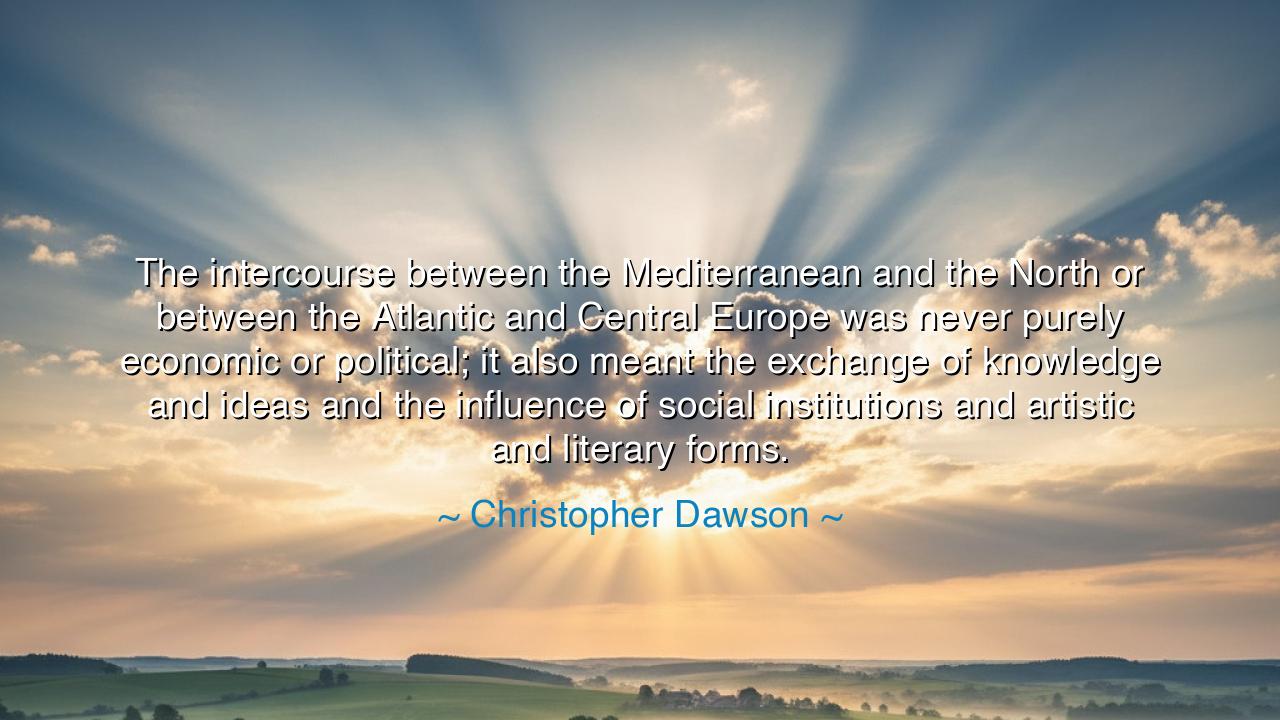
The intercourse between the Mediterranean and the North or
The intercourse between the Mediterranean and the North or between the Atlantic and Central Europe was never purely economic or political; it also meant the exchange of knowledge and ideas and the influence of social institutions and artistic and literary forms.






“The intercourse between the Mediterranean and the North or between the Atlantic and Central Europe was never purely economic or political; it also meant the exchange of knowledge and ideas and the influence of social institutions and artistic and literary forms.”
Thus spoke Christopher Dawson, the great historian of culture and faith, whose mind perceived the deep rivers of connection flowing beneath the surface of human history. His words summon us to see civilization not as a mere contest of power or trade, but as a living dialogue of souls — a sacred exchange of knowledge, art, and spirit among nations. For Dawson understood what so many forget: that commerce may move goods, but culture moves hearts; treaties may bind kingdoms, but ideas bind humanity.
In this saying, the word “intercourse” bears not the shallow sense of transaction, but the ancient meaning of communion — the meeting of peoples, the mingling of destinies. When the ships of the Mediterranean sailed northward, they carried not only spices and silver, but stories, songs, and philosophies. From Athens came wisdom, from Rome came law, from the monasteries of Ireland came faith reborn. And when they met, a new light dawned upon Europe, illuminating its darkened valleys with the brilliance of shared understanding. Dawson reminds us that history’s greatest movements are not written in coin or conquest, but in the transformation of the human spirit through contact.
Consider the Renaissance, that divine rebirth of art and thought. It was not born in isolation, but through exchange — the rediscovery of Greek learning preserved by Arab scholars, the merging of Eastern science and Western theology, the trade of manuscripts as precious as gold. When merchants from Venice met the scholars of Constantinople, and when the printing press carried their wisdom into every city, the world changed forever. What began as the meeting of seas became the awakening of minds. This was the intercourse of civilizations — not a clash, but a communion that lifted humanity from the shadows of ignorance into the dawn of enlightenment.
So too, in the age of exploration, when the Atlantic world opened its arms to the vast unknown, the exchange between the Old and the New was more than material. From Europe sailed merchants and conquerors, yes — but also poets, thinkers, and dreamers. And though blood and greed marked that era, something nobler survived: the birth of a global consciousness, where cultures began to weave together, however painfully, into one human fabric. From these crossings came new music, new philosophies, new visions of liberty and equality — seeds that would later bloom in revolutions of both mind and heart.
Dawson’s insight, then, is not merely historical — it is eternal. He teaches that civilization thrives upon encounter. When people close their borders, when they fear the foreign tongue or the unfamiliar idea, their culture withers like a field denied sunlight. But when they reach outward — to learn, to listen, to share — their soul expands. The vitality of Europe, he saw, was born not from isolation, but from the constant dialogue between worlds. The Mediterranean gave the North its grace; the North gave the South its vigor. From that dance arose the spirit of the West itself.
The lesson for our own time is clear and urgent. In an age when nations turn inward and voices grow wary of difference, we must remember Dawson’s wisdom: that the exchange of knowledge and ideas is the lifeblood of progress. The internet, the airplane, the open classroom — these are our modern Mediterranean seas, upon which we sail toward understanding. Yet if we use them only for profit or power, and not for wisdom and fellowship, then we betray the very gift that built our world. Let every citizen, therefore, become both student and teacher in the global dialogue of cultures.
O child of the future, take this truth into your heart: the flow of ideas is the breath of civilization. Travel, read, speak, and listen — not only to those who mirror your thoughts, but to those who challenge them. Seek not merely to trade, but to learn; not only to gain, but to give. For in every exchange of mind and heart, the world grows richer, and the spirit of mankind draws closer to its divine unity. As Dawson saw, the greatest history is not written in battles or treaties, but in the quiet miracle of understanding between souls.
Thus, let your life be a bridge, not a wall. Let your mind be a harbor where many ships may anchor. For where there is exchange, there is life; where there is understanding, there is peace; and where there is communion of knowledge and art, there — and only there — does civilization endure.






AAdministratorAdministrator
Welcome, honored guests. Please leave a comment, we will respond soon